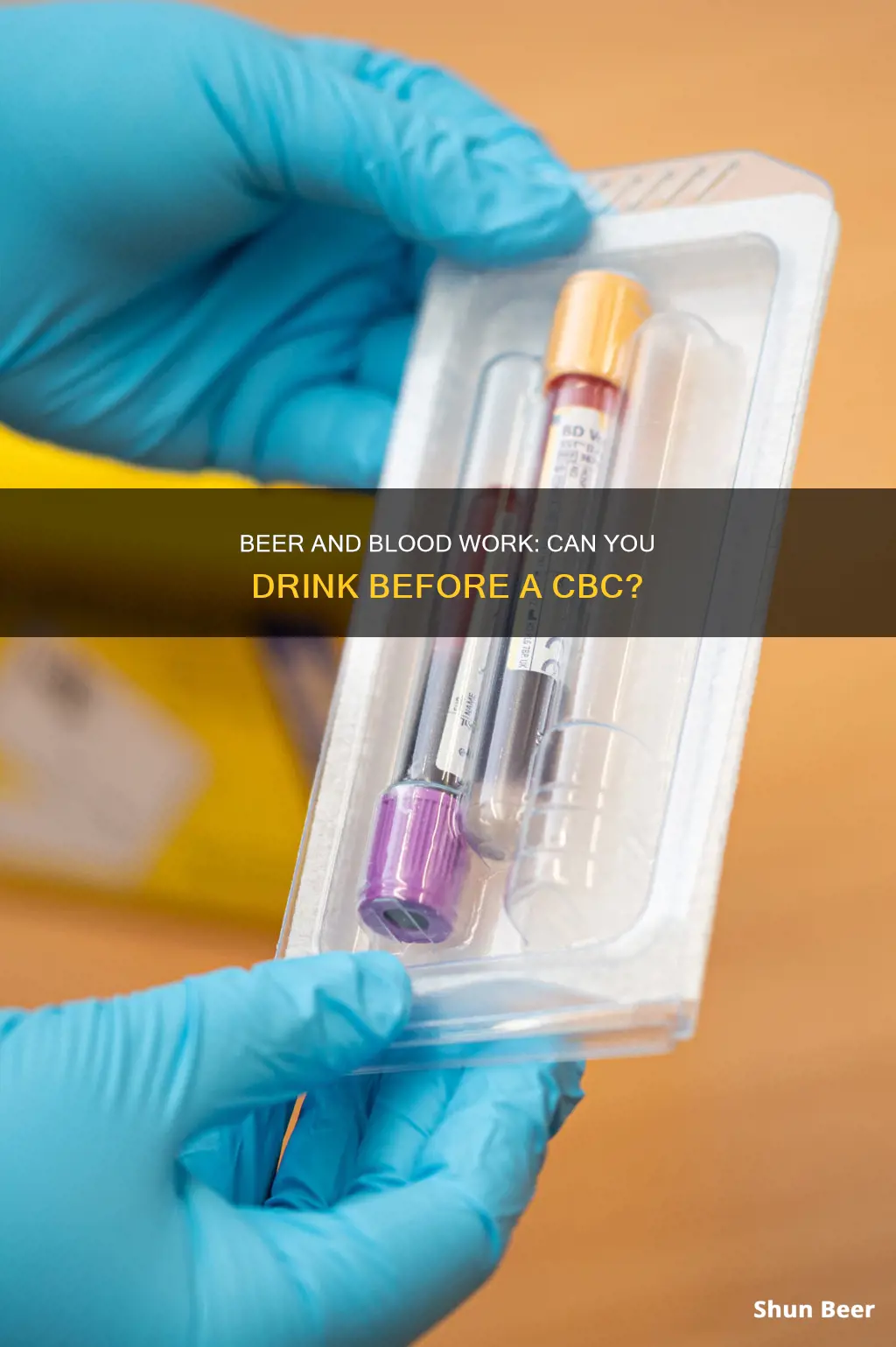
It is common for people to wonder if they can drink alcohol before a blood test, especially if they have a drink or two at the end of the day or on special occasions. Alcohol can affect the accuracy of specific blood tests by impacting the levels of certain substances in the blood. For instance, alcohol can affect glucose levels, liver enzymes, and electrolyte levels, which can lead to inaccurate results in blood sugar tests, liver function tests, and coagulation tests. To ensure the most accurate results, it is generally recommended to avoid alcohol for at least 24 hours before a blood test. However, moderate alcohol consumption, defined as one drink per day for women and up to two drinks per day for men, is considered acceptable by some sources. Nevertheless, it is always best to consult with a healthcare provider if you have any concerns about the potential impact of alcohol on your blood test results.
What You'll Learn

Alcohol can remain in the bloodstream for 12 hours
Drinking alcohol can affect blood test results, so it is typically recommended to avoid alcohol before a complete blood count (CBC). Alcohol can remain in the bloodstream for up to 12 hours, and even longer in trace amounts. Therefore, it is generally advised to refrain from drinking alcohol for at least 12 hours before a blood test.
The presence of alcohol in the bloodstream can cause temporary irregularities that may lead to inaccurate test results. Alcohol can affect glucose levels, impacting blood sugar test results. It can also alter enzyme activity and fat metabolism in the liver, which can affect various blood test components. This can result in inaccurate readings, particularly in tests that rely on liver function markers and lipid levels.
In addition, alcohol consumption can impact the clotting ability of the blood, which may affect coagulation test results. It can also alter the pH balance of the blood, potentially influencing the accuracy of electrolyte tests.
The amount of alcohol consumed and the type of blood test being performed are important factors to consider. For moderate drinkers, having one to two drinks the night before a blood test is usually acceptable. However, heavy drinkers may need to abstain from alcohol for a more extended period to ensure accurate results.
It is always best to consult with a healthcare provider if there are any concerns about the potential impact of alcohol on blood test results. They can provide personalized guidance based on the specific test and the individual's alcohol consumption.
Drinking Beer and Driving in Mexico: What's Allowed?
You may want to see also

Doctors recommend fasting for 8-12 hours before a CBC
It is not advisable to consume alcohol before a CBC (complete blood count) test. Alcohol can affect the accuracy of specific blood tests by altering the levels of certain substances in the blood. For instance, alcohol can affect glucose levels, enzyme levels, and fat metabolism in the liver, which can lead to inaccurate readings in blood tests that rely on liver function markers and lipid levels.
Doctors typically recommend fasting for 8-12 hours before a CBC test. This means refraining from consuming any food or beverages, including alcohol. Fasting ensures that the blood sample is not influenced by temporary changes in the body, providing a clearer picture of the diagnosis.
The presence of alcohol in the bloodstream can interfere with the accuracy of certain blood tests. Alcohol contains 'ethanol', a psychoactive substance that can remain in the bloodstream for up to 12 hours after consumption. Even small amounts of alcohol can be traced in the bloodstream several days after drinking. Therefore, it is crucial to abstain from alcohol before a CBC test to ensure accurate results.
If you have consumed a small or moderate amount of alcohol within the past 24 hours before your CBC test and are concerned about its impact on the results, it is recommended to discuss this with your healthcare provider. They can advise you on the best course of action based on the specific test and the amount of alcohol consumed.
In summary, it is generally recommended to refrain from drinking beer or any other alcoholic beverage the day before a CBC test. Following your doctor's instructions and considering the specific requirements of the test will help ensure accurate and reliable results.
Beer and Amoxicillin: Safe Mix?
You may want to see also

Alcohol can affect the accuracy of blood test results
Alcohol can have a significant impact on the accuracy of blood test results, and it is generally recommended to refrain from consuming alcohol before a blood test. This is because alcohol can affect the levels of certain substances in the blood, leading to potential inaccuracies.
One of the key substances affected by alcohol consumption is glucose, a type of sugar. Alcohol interferes with the body's ability to regulate glucose levels, as it impairs the liver's glucose production and can lead to hypoglycemia. As a result, drinking alcohol before a blood test can cause irregular blood sugar levels and lead to inaccurate test results.
Alcohol also influences enzyme activity and fat metabolism in the liver. This can affect various blood test components, particularly those that rely on liver function markers and lipid levels, leading to inaccurate readings. For example, liver function tests and lipid panel blood tests can be affected by alcohol consumption.
In addition, alcohol can alter the clotting ability of the blood, which can impact the results of a coagulation test. Alcohol can also change the pH balance of the blood, affecting the accuracy of electrolyte tests.
The impact of alcohol on blood test results depends on the specific test and the amount of alcohol consumed. For moderate drinkers, having one or two drinks the night before a blood test is usually acceptable. However, for heavy drinkers, abstaining from alcohol for a more extended period before the test may be necessary to ensure accurate results.
To ensure the most accurate blood test results, it is recommended to avoid alcohol for at least 24 hours before the test. If you have consumed a small amount of alcohol within this timeframe, it is important to discuss this with your healthcare provider, as it may still impact your test results.
Pregnancy and Root Beer: Is It Safe to Drink?
You may want to see also

Alcohol can affect glucose levels in the blood
Alcohol can have a significant impact on glucose levels in the blood, especially for people with diabetes. It's important to understand these effects, as they can influence medical tests and overall health.
Firstly, alcohol interferes with the body's ability to regulate blood sugar levels. This is because the liver, which is responsible for storing and releasing glucose, prioritises breaking down alcohol instead of its usual function of releasing glucose. As a result, blood sugar levels can drop too low, a condition known as hypoglycemia. This risk is heightened when drinking on an empty stomach, as the liver has no external source of glucose to draw from.
The risk of hypoglycemia increases with each alcoholic drink consumed, and it can be mitigated by consuming alcohol with food, especially carbohydrate-rich foods. It is recommended to monitor blood sugar levels before, during, and after drinking, and to have a source of carbohydrates, such as glucose tablets, readily available.
Alcohol can also lead to hyperglycemia, or elevated blood sugar levels, particularly in well-nourished individuals with type 2 diabetes. This may be due to alcohol-induced insulin resistance or a lack of compliance with dietary and pharmacological treatment regimens.
Additionally, alcohol can affect the body's counter-regulatory response to hypoglycemia, delaying glucose recovery. This means that even after an episode of low blood sugar, glucose levels may take longer to return to normal, posing a potential health risk.
Furthermore, alcohol consumption can worsen diabetes-related complications such as disturbances in fat metabolism, nerve damage, and eye disease. It can also increase triglyceride levels in the blood, which is a risk factor for cardiovascular disease.
Alcohol can also interfere with the effectiveness of diabetes medications, including oral medications and insulin. This is because alcohol disrupts the liver's ability to turn proteins and fats into carbohydrates, which are needed for energy during exercise or between meals.
It's important to note that the effects of alcohol on blood glucose levels can vary depending on whether it is consumed in the fed or fasting state. Acute alcohol consumption with a meal may even have a beneficial effect by slightly lowering blood sugar levels in diabetics. However, chronic alcohol consumption in a well-nourished state can lead to increased blood sugar levels.
In summary, alcohol can have significant effects on glucose levels in the blood, especially for individuals with diabetes. It is essential to drink in moderation, preferably with food, and to monitor blood sugar levels closely to avoid potential health complications.
Drinking Beer While on Antidepressants: What You Should Know
You may want to see also

Heavy drinking can be detected in blood tests
Blood tests are a common medical procedure, but they can be affected by drinking alcohol beforehand. Alcohol can stay in the bloodstream for up to 12 hours, and even tiny amounts can be traced in the blood several days after consumption.
Blood tests that are specific to liver enzymes are particularly affected by alcohol consumption. This includes liver function tests, which can be impacted by alcohol's effect on enzyme levels in the liver. Alcohol can also affect the accuracy of blood sugar tests, as it can disrupt the balance of glucose regulation in the body. This can lead to hypoglycemia. Additionally, alcohol can alter enzyme activity and fat metabolism in the liver, affecting various blood test components and leading to inaccurate readings, especially in tests that rely on liver function markers and lipid levels.
If you are a heavy drinker, it is important to be honest with your healthcare provider about your alcohol consumption. They may recommend that you abstain from alcohol for a certain period before the blood test to ensure accurate results. Heavy alcohol consumption can also lead to serious health problems, including liver damage and an increased risk of certain cancers. If you are a heavy drinker, it is crucial to seek help and support to reduce your alcohol intake.
Beer Drinking in Central Park: What's the Rule?
You may want to see also
Frequently asked questions
It is not recommended to drink beer or any alcoholic beverage the day before a CBC (Complete Blood Count) test. Alcohol can affect the accuracy of specific blood tests by altering the levels of substances in the blood, such as glucose and liver enzymes. To ensure the most accurate results, it is generally advised to abstain from alcohol for at least 24 hours before the test.
Alcohol can be detected in the bloodstream for up to 12 hours after consumption. However, it takes up to 25 hours for the body to fully metabolize and clear a moderate amount of alcohol.
Alcohol consumption can disrupt the balance of glucose regulation, impair the liver's ability to produce glucose, and alter enzyme activity and fat metabolism in the liver. These changes can lead to inaccurate blood test results, especially those that rely on liver function markers and lipid levels.
Yes, it is recommended to follow your doctor's instructions and get plenty of sleep the night before. You may also be required to fast for 9-12 hours, avoiding food and drinks except water. Staying hydrated by drinking plenty of water is also advisable, as it keeps more fluid in your veins, making the blood draw easier.







